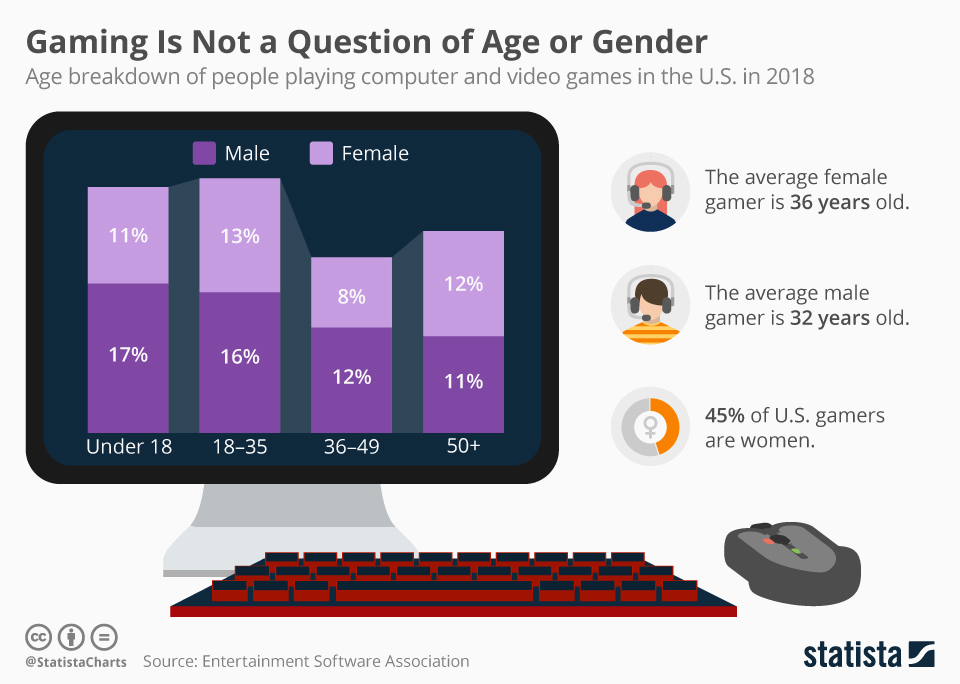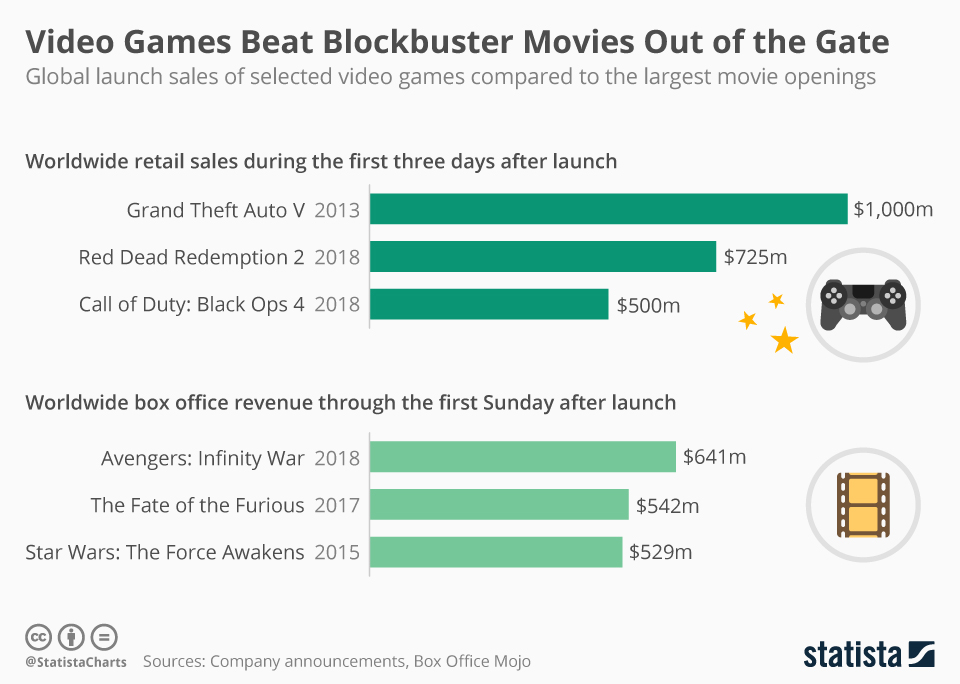The Rundown:
At any given time of the day, nearly 1.2 million people are watching (and donating money to) pro gamer live streams. Media conglomerates, entertainment companies, and even Las Vegas Casinos are searching for their entry point into this absolute gold mine of an industry. By 2027, eSports and video game streaming will be the most lucrative form of entertainment.
Last month, video game enthusiasts watched nearly 850 million hours of content on Twitch. The Global Gaming Market is projected to top $134.9 Billion this year. We’ve reached a point where you can no longer deny the cultural significance of video games and the massive role they are claiming in society.
Twitch, which is the premier streaming platform for gamers, sees an average concurrent viewership of 1,187,528. This means at any given time of day, over a million people are likely to be watching gamers play live.
To put this in perspective, average daily viewership last year for:
- CNN was 783,000
- MSNBC was 885,000
- Fox News Channel and ESPN each had about 1.5 million viewers.
All the signs are pointing to one thing, and one thing only, eSports is going to be huge!
By 2027, eSports and video game streaming will be the most lucrative form of entertainment. Five years following, by 2032, we’ll be able to identify at least one video game that has joined the “evergreen” ranks of basketball, baseball, football, and futbol , as a fixture in sport culture.
These bold predictions are rooted, first of all, in the unparalleled cultural momentum.
Already a future thinker?
Then become a friend.
Gaming Culture
This is not a culture you can pass judgment or doubt upon anymore, as the game-nerd stigma fades and video games become a fixture in everyone’s lives. What was once seen as an antisocial act for the dweebs of society has shifted into the cool category. Yes, it is now cool to be good at video games.
You’ve got Drake and Travis Scott streaming Fortnite games side-by-side with the popular gamer: Ninja. In fact, when they all hopped on a game of Fortnite together, over 688,000 people watched them play. That’s on par with an NFL game!
The sheer fact that hip-hop icons today associate themselves with the game-nerd persona is astounding. This is not something that was culturally “accepted” just ten years ago.

In 2018 and moving forward, the demographic of gamers will continue inching its way to resembling the same demographic spread of the United States, with children all the way up to the elderly playing games.
Gaming culture is now a part of mass culture. Whether or not you ever tune in to a live stream, you’re going to be affected by gaming. Especially if you watch any type of traditional sport.
The TV viewing interfaces of traditional sports are adapting to similar interfaces we see in their video game counterparts.
Starting in last year’s MLB postseason and becoming quite popular this year, you may have seen the virtual strike zone graphic overlayed on the broadcast of your favorite baseball games. This has always been an attribute in baseball video games and now here it is in real baseball.
Amazon’s NextGen Analytics platform has partnered with the NFL to imagine how the future of NFL games will be viewed. Today, we’re seeing a heavy influx of data into broadcasting sessions, commenting on players’ acceleration speeds, catching probabilities, and other oddly interesting uses of data that make broadcasts resemble a game of Madden:
The cultural influence is really only one side of the story. I think the truly fascinating part of eSports is the multifaceted economy that is booming around it.
The Unbelievable, Multifaceted Gaming Economy
Gaming companies are making money like never before and really showing us why they’ll be the most lucrative form of entertainment. Compare the opening weekends of the most popular video games with the most popular films:

This is where the economy used to end. Game developers, gaming systems, and the stores would each make a percentage of the sales. That was it. Now, however, this is just the start of the economy.
Once a game is released, millions of people spend every free moment mastering their skills. The savviest and best gamers hop on Twitch and
Donation data is generally kept secret, but these are the estimated earnings of some of the best streamers:
- Shroud – plays CS
:GO – earns over $100,000/month in donations DrDisRespect – plays Fortnite – earns over $120,000/month in donations- Among other streamers
It should also be noted that it’s not just for the best gamers to make money through donations. Sometimes it’s the streamers with great personalities that garner loyal followings.
There’s a streamer that I frequently watch
This form of income through donation is really not something we witness in any other form of entertainment. Could you imagine LeBron James streaming his practices for 6-8 hours a day and allowing his fans to chat with him? That’s just not possible for a basketball player.
This particular activity, gaming, allows for a truly unique relationship to be built between fan and idol. It’s why streamers can live off of donations. In just the past year or so, another form of income has presented itself in this economy.
Coaching the Competition
Gamers that have a lot of talent, but may not have audiences or sponsorships necessary to support themselves financially are turning to video game training. Yep, amateur players are paying their favorite gamers to help them improve.
Hanson—better known by his Fortnite username, UnknownAvix—is a college student in California who is paying for his education by coaching Fortnite. He tailors his lessons to the skill level of each student, covering everything from the best spots on the map for finding loot to the quickest ways to build structures to defend or attack.
Alex Anthony, MIT Technology Review
It may sound foreign at first, but honestly, it makes total sense. There are a lot of really good players out there that need to make money. And there are a lot really bad players out there (with money) that would like to improve.
It’s no different than investing in a pitching instructor for baseball or shooting form trainer for basketball. Then again, since gaming is a sport you can play for a lifetime, maybe it’s more along the lines of working with a golf pro to improve one’s swing.
Obviously, as proven thus far in the article, there are financial opportunities in gaming. Parents are beginning to accept video games as a career path or at least a social activity.
I’d like to draw a parallel to the kids of the 60s that wanted to be rockstars. In their parents’ eyes, this was the most idiotic thing they could do. What were the career opportunities? Just a decade or two later, there were literally hundreds of bands – from Queen to Def Leppard – making a living playing rock n’ roll. Some, not at all, parents began seeing the career validity and invested in their kid’s future.
Think about how far we’ve come with video games. For the past forty-some years, there have been kids that wanted to play video games for a living. At best, they may have become a game tester at a development company. Now, there are hundreds of success stories of people turning video game playing into a career.
Some of the more serious parents may pay for their kid to have private, daily lessons from a coach. A quick job search on Indeed resulted in over 40 eSports trainers. (There will probably be a better platform for connecting trainers with players to come out soon).
Parents that would like their kids to test the waters first, may send them to an eSports camp such as Game Gym, GameCamp, or eSports Camps (real creative name, guys).
It’s incredible to think that virtually anyone can pick up a game controller and make a living. It’s vastly different from other sports where the opportunities for a career are limited to the top 0.001%. This is why it’s such an exciting time for eSports. It’s also why there are a ton of corporations looking to sneak their way into controlling the industry.
This concludes Part 1. Tomorrow, we’ll discuss how media conglomerates and Las Vegas Casinos are inching their way into eSports.
